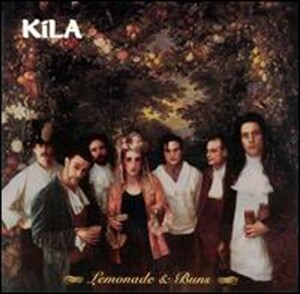 When listening to traditional Irish music, it’s often possible to sense an ancient tribal rhythm lurking beneath the surface, the hint of a wild beat that must have been driven by frenzied drums with the power to set the soul free. It seems one can almost hear in the cadence of a melody, an echo of chanting that could draw the ecstatic out of the ordinary. Encoded in the melodies and rhythms is something that calls to many of us, the trace of something very attractive, something moving, yet often only partly realized within the traditional form. We long for the music to release us, so we order another pint at the session, or hit the dance floor in the smoky bar. It takes magic to draw this wildness from the music, magic and a fluency in the language of instruments and rhythms from places where drums were the center of the music. Kila speak this language with great fluency. Kila know magic.
When listening to traditional Irish music, it’s often possible to sense an ancient tribal rhythm lurking beneath the surface, the hint of a wild beat that must have been driven by frenzied drums with the power to set the soul free. It seems one can almost hear in the cadence of a melody, an echo of chanting that could draw the ecstatic out of the ordinary. Encoded in the melodies and rhythms is something that calls to many of us, the trace of something very attractive, something moving, yet often only partly realized within the traditional form. We long for the music to release us, so we order another pint at the session, or hit the dance floor in the smoky bar. It takes magic to draw this wildness from the music, magic and a fluency in the language of instruments and rhythms from places where drums were the center of the music. Kila speak this language with great fluency. Kila know magic.
Lemonade and Buns, Kila’s latest offering, continues the wild instrumentals and hypnotic vocals that made Tog e Go Bog e such a delight. Melodies on the uilleann pipe sound as if they were lifted from a session, lured away from the safety of indoors into the night by a fairy lover with djembe and a rain stick. Then the saxophone takes over, and the music conveys the ease and warmth of the tropics, where we can really surrender to the need to dance. Vocal numbers are frenzied, with simple melodies that become a part of the texture of bass, percussion, and wailing middle eastern influences that blend with Irish tunes and insist on dancing — or why else would this music exist?
The power of the voice, the pipe, the fiddle and the rhythm are all woven together into a heady tapestry of sound with the power to take the listener to a place where tribal is good, dancing is life, and rhythm has power. It ends with a soulful vocal number evocative of the plaintive mournful aspects of Irish music. Many bands have tried to evoke this magic by being loud, by being fast, and we love them for it. But Kila have the range and the musical vocabulary to select the right phrasings, the right instruments, the best arrangements to create something doesn’t strain, that isn’t self-consciously trying to achieve freedom from convention. This is powerful music, erudite in its use of rhythm and percussion to bring the primal aspects of Irish music to the surface.
I’m not going to tout any standouts here, because the whole album is enchanting and forms a seamless whole that I’ve set to continuous play on the CD player at home and at work. Oh, I know there’s an end, but I find myself wanting to stay in the space that this album creates. Listen to this one on a good sound system because it’s multi-layered, and consider buying cordless headphones so as not to annoy house mates who have the audacity to want to listen to something else. Rejoice in being privileged to live at a time when great musicians have the traditions of the world at their disposal, when creating conversations between musical forms enables bands like Kila to create magic.
(Green Linnet, 2000)
